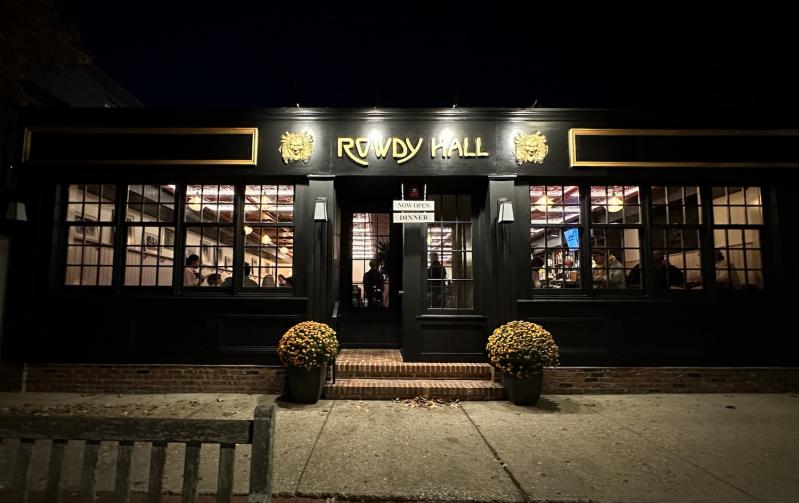The Rowdy Hall restaurant’s Nov. 14 reopening in a new location, at 177 Main Street in Amagansett, came just days after East Hampton Town officials issued it a stop-work order and a violation for not having a building permit, its facade having been painted black despite a town architectural review board decision to the contrary.
Last Thursday, the property that previously housed Main Street Tavern and, before that, Indian Wells Tavern, experienced a setback of a different sort when the town board withdrew a resolution that would have approved a $100,500 grant to replace its septic system, which is failing.
The project was one of nine recommended to the town board for funding with the portion of the community preservation fund that can be allocated for water quality improvement projects. The board voted to award grant money for seven of the Water Quality Technical Advisory Committee’s nine recommendations last Thursday.
The recommendation for the septic system upgrade at 177 Main Street, intended to reduce impacts to groundwater, came at an Oct. 10 work-session presentation by the committee. At that presentation, Mellissa Winslow, a senior environmental analyst in the town’s natural resources department, told the board that the upgrade would result in a reduction of 406 pounds of nitrogen per year.
The property was awarded funding in 2021 but later changed hands. “The new owners would like to move,” Ms. Winslow said last month in recommending the $100,500 grant, or 50 percent of eligible installation costs.
But some residents had spoken against awarding money to a commercial property owner. David Buda of Springs told the board last Thursday that the listed applicant, a limited liability company called 177 Main Street, was no longer the current owner. Rather, earlier this year the L.L.C. had sold it to another L.L.C., ROP Amagansett, controlled by the Texas real estate development and construction company River Oak Properties. The sale price was reported to be $4.45 million.
“It should be obvious to everyone in town by now that there is a serious problem at this property caused by a tenant that has decided to blatantly defy and disregard the town’s regulatory authority and the decision of the A.R.B.,” Mr. Buda said. The town should not “donate” C.P.F. money, he said, “to a property owner whose tenant is a defiant transgressor. I urge you to hold this erroneously worded resolution until such time as the rule of law is restored to the Amagansett Historic District at 177 Main Street.”
The resolution for 177 Main Street, which was separated from the committee’s eight other recommendations, had already been flagged for withdrawal, Councilwoman Cate Rogers told Mr. Buda, who had previously questioned a C.P.F. allocation for the commercial property. So had Jaine Mehring of Amagansett, who asked at a Nov. 2 public hearing on the nine recommendations if properties owned by investors “should be prioritized or even eligible” for C.P.F. grants. “They buy with full knowledge of what they are buying,” she said, adding that upgrades “should be considered the requisite cost of doing business.”
Another of the committee’s nine recommendations was tabled last Thursday, that for the Springs General Store, also for a septic-system upgrade. “My understanding is that’s still in the planning board process,” Councilwoman Kathee Burke-Gonzalez said of the site, recommending that a vote on allocating $109,639 for the project be postponed.
That left seven water quality improvement projects for which the board voted to allocate money. The Clearwater Beach Homeowners Association was awarded $63,446 to remove a 25,000-square-foot asphalt parking lot and replace it with a permeable surface to reduce stormwater runoff to Hog Creek. The Springs Presbyterian Church will receive $322,200 to upgrade its septic system and install stormwater control in its parking lot to reduce impacts to Accabonac Harbor.
Pharao Beach Inc. was awarded $199,615, also for a septic-system upgrade, at the cottages and residence at 3 South Lake Drive in Montauk to reduce impacts to Lake Montauk. Harbor Marina in Springs will upgrade the septic system serving a marina, restaurant, and residence to reduce impacts to Three Mile Harbor. That award is $105,196. Cornell Cooperative Extension was awarded $198,000 for installation of a permeable reactive barrier behind a new bulkhead at 60 Harbor View Lane — the residence at Harbor Marina — to reduce impacts of contaminated groundwater to Three Mile Harbor.
The New York State Center for Clean Water Technology was awarded $112,101 for installation of eight remote monitoring devices to measure the performance of innovative alternative septic systems, such as those replacing the conventional systems in the abovementioned initiatives. Lastly, Sag Harbor Village was awarded just over $1.03 million for installation of street and house-to-street piping in Sewershed L to collect and convey 12,562 gallons per day of flow to an existing sewage treatment plant.




